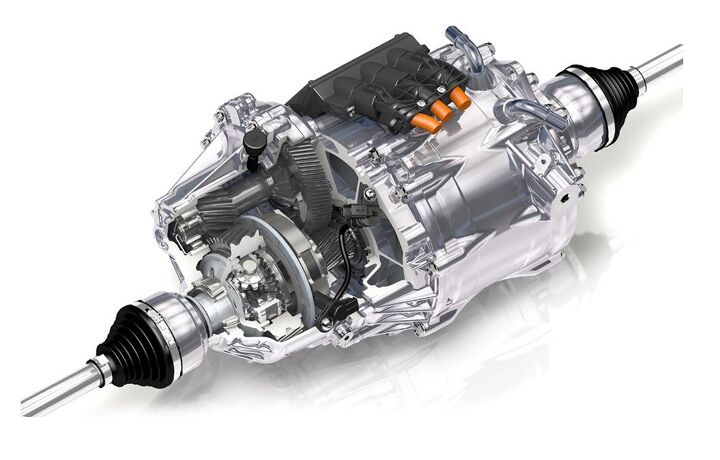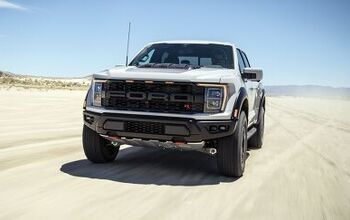GKN Wants Compact Car Makers to Demand More From Their Rear Axles

Front-wheel drive, four-cylinder cars have defined the automotive C-segment for decades, but maybe these automakers aren’t dreaming big enough.
That’s the message being sent by global technology supplier GKN Automotive, which really, really wants automakers to buy a lower-cost version of its eAxle for use in affordable compacts. GKN says the unit would allow the segment to more easily offer electric all-wheel drive and plug-in capability.
Developed by the GKN Driveline division, a high-end version of the eAxle exists in the BMW i8, Porsche 918 and Volvo XC90 T8 plug-in.
By putting electric power to the rear wheels of a normally front-drive vehicle, GKN claims their downsized eAxle module would shorten 0-60 miles per hour acceleration times by several seconds, while making a fully-electric driving mode possible. Emissions and fuel consumption could also be reduced significantly.
“GKN leads the industry in eAxle technology, and we want to make plug-in hybrids a simple upgrade for consumers and manufacturers,” stated GKN Automotive President of Engineering Peter Moelgg in a release.
“Innovations by our hardware and software engineers will place the performance and efficiency benefits of plug-ins within the reach of many more motorists.”
The new eAxle weighs 46 pounds, and is able to provide an additional 88 horsepower to the rear wheels of a compatible vehicle. An electromechanically actuated dog clutch would disconnect the electric motor above a certain speed, allowing the conventional engine to power the car via the front axle.
With a 9.3 kWh battery and 81-horsepower electric motor connected to its eAxle, a Volvo XC90 (which weighs at least 1,500 pounds more than your average compact) claims an electric range of about 15 miles.
Are we on the verge of seeing a Honda Civic plug-in? An all-wheel-drive Hyundai Elantra? Will Subaru end up looking like an environment-destroying dinosaur?
As with everything else, that’s for the automakers’ bean counters to decide.
[Image: GKN Automotive]

More by Steph Willems
Latest Car Reviews
Read moreLatest Product Reviews
Read moreRecent Comments
- Varezhka I have still yet to see a Malibu on the road that didn't have a rental sticker. So yeah, GM probably lost money on every one they sold but kept it to boost their CAFE numbers.I'm personally happy that I no longer have to dread being "upgraded" to a Maxima or a Malibu anymore. And thankfully Altima is also on its way out.
- Tassos Under incompetent, affirmative action hire Mary Barra, GM has been shooting itself in the foot on a daily basis.Whether the Malibu cancellation has been one of these shootings is NOT obvious at all.GM should be run as a PROFITABLE BUSINESS and NOT as an outfit that satisfies everybody and his mother in law's pet preferences.IF the Malibu was UNPROFITABLE, it SHOULD be canceled.More generally, if its SEGMENT is Unprofitable, and HALF the makers cancel their midsize sedans, not only will it lead to the SURVIVAL OF THE FITTEST ones, but the survivors will obviously be more profitable if the LOSERS were kept being produced and the SMALL PIE of midsize sedans would yield slim pickings for every participant.SO NO, I APPROVE of the demise of the unprofitable Malibu, and hope Nissan does the same to the Altima, Hyundai with the SOnata, Mazda with the Mazda 6, and as many others as it takes to make the REMAINING players, like the Excellent, sporty Accord and the Bulletproof Reliable, cheap to maintain CAMRY, more profitable and affordable.
- GregLocock Car companies can only really sell cars that people who are new car buyers will pay a profitable price for. As it turns out fewer and fewer new car buyers want sedans. Large sedans can be nice to drive, certainly, but the number of new car buyers (the only ones that matter in this discussion) are prepared to sacrifice steering and handling for more obvious things like passenger and cargo space, or even some attempt at off roading. We know US new car buyers don't really care about handling because they fell for FWD in large cars.
- Slavuta Why is everybody sweating? Like sedans? - go buy one. Better - 2. Let CRV/RAV rust on the dealer lot. I have 3 sedans on the driveway. My neighbor - 2. Neighbors on each of our other side - 8 SUVs.
- Theflyersfan With sedans, especially, I wonder how many of those sales are to rental fleets. With the exception of the Civic and Accord, there are still rows of sedans mixed in with the RAV4s at every airport rental lot. I doubt the breakdown in sales is publicly published, so who knows... GM isn't out of the sedan business - Cadillac exists and I can't believe I'm typing this but they are actually decent - and I think they are making a huge mistake, especially if there's an extended oil price hike (cough...Iran...cough) and people want smaller and hybrids. But if one is only tied to the quarterly shareholder reports and not trends and the big picture, bad decisions like this get made.


































Comments
Join the conversation
My 2006 Highlander Hybrid approves of this message.
About darn time. Never made sense to me to package the hybrid drive motor on the front axle rather than the rear.